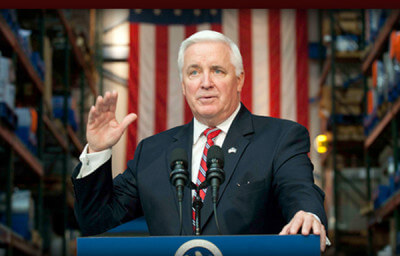Newark Mayor Cory Booker, New Jersey's senator-elect, gathers with gay and lesbian couples at City Hall at midnight on October 21. | NEW JERSEY UNITED FOR MARRIAGE
Recognizing the inevitability of losing in his effort to overturn a state superior court marriage equality ruling, Governor Chris Christie has dropped the appeal he had filed with the New Jersey Supreme Court.
That court was scheduled to hear oral arguments in the state’s appeal of Mercer County Superior Court Judge Mary Jacobson’s September 27 ruling, but on October 18 had unanimously declined to stay her ruling pending that appeal.
Weddings of same-sex couples took place in a number of New Jersey municipalities on the stroke of midnight on October 21. In Newark, Cory Booker, that city’s mayor and New Jersey’s US senator-elect, officiated over the ceremonies of seven couples.
Same-sex weddings began at midnight on October 21 and the governor recognizes the change is permanent
The Christie administration statement, issued shortly after 9 a.m. on October 21, read, “Although the governor strongly disagrees with the court substituting its judgment for the constitutional process of the elected branches or a vote of the people, the court has now spoken clearly as to their view of the New Jersey Constitution and, therefore, same-sex marriage is the law. The governor will do his constitutional duty and ensure his administration enforces the law as dictated by the New Jersey Supreme Court.”
Three days before, the State Supreme Court, declining to give the governor the stay he sought, wrote, “Because, among other reasons, the State has not shown a reasonable probability of success on the merits, the trial court’s order — directing State officials to permit same-sex couples, who are otherwise eligible, to enter into civil marriage starting on October 21, 2013 — remains in effect.”
In an opinion written by Chief Justice Stuart Rabner, the court signaled that it was likely to accept the conclusions of Judge Jacobson’s ruling –– that with the Defense of Marriage Act’s ban on federal recognition of same-sex marriages struck down earlier this year, civil union couples in New Jersey do not enjoy the same rights and benefits as married different-sex couples. In 2006, the state’s high court ruled that New Jersey must give same-sex couples such parity, either through equal marriage rights or a parallel institution such as civil unions.
“The State’s statutory scheme effectively denies committed same-sex partners in New Jersey the ability to receive federal benefits now afforded to married partners,” he wrote, adding, “We conclude that the State has not shown a reasonable probability or likelihood of success on the merits.”
Jacobson had rejected the state’s argument that the plaintiffs –– same-sex couples and Garden State Equality, the state’s LGBT rights lobby, represented by Lambda Legal –– should sue the federal government for not recognizing civil unions on parity with same-sex marriages. The state, she wrote, “persists in denying its responsibility for the current predicament of New Jersey civil union couples.” Jacobson pointed out that New Jersey has done nothing to persuade the federal government to recognize civil unions, leaving the burden entirely on civil union partners to bring their own lawsuits against federal agencies.
“Plaintiffs would face an enormous litigation burden if they were required to challenge, on their own, every federal agency interpretation of [the US Supreme Court’s DOMA ruling] denying equal access to marital benefits to civil union couples,” she wrote.
In denying Christie’s bid for a stay, the State Supreme Court noted that delaying Jacobson’s order put a burden on same-sex couples, while the state was not harmed by allowing marriages to begin.
“Plaintiffs highlight a stark example to demonstrate the point,” Chief Justice Rabner wrote. “If a civil union partner passes away while a stay is in place, his or her surviving partner and any children will forever be denied federal marital protections. The balance of hardships does not support the motion for a stay.”
The State Legislature passed a marriage equality bill in early 2012, but it was vetoed by Christie, who urged advocates to seek approval for gay marriage in a referendum. Advocates had until mid-January 2014 to win a veto override and said they intended seek a vote on that after the November 5 election, which Christie is widely expected to win handily.
Garden State Equality did not immediately respond to a question about whether the group sees any need to seek to have marriage equality codified in law by continuing its veto override efforts.
On October 18, when the State Supreme Court declined to stay Jacobson’s ruling but Christie’s appeal was still in the works, Garden State Equality and its partner, New Jersey United for Marriage, signaled they would push forward in seeking an override in the Legislature.
“This is not the time to rest – it is the time to recommit, it is the time to pull out all the stops,” GSE’s executive director, Troy Stevenson, said in a written statement. “We have to continue to push because we are in the fight of our lives. While we have faith in the courts, we cannot control what happens there. What we can do is demand that action be taken at the State House.”
Michael Premo, the campaign manager at New Jersey United For Marriage, said, “With the Supreme Court not set to hear the merits of the case until after the new year, we will continue to work every day to guarantee the freedom to marry as quickly as possible. The fastest way to do this once and for all is through the Legislature.”
New Jersey is the 14th state to allow gay and lesbian couples to marry. Gay marriage is also the law in the District of Columbia. One-third of the US population now lives in marriage equality jurisdictions.





























